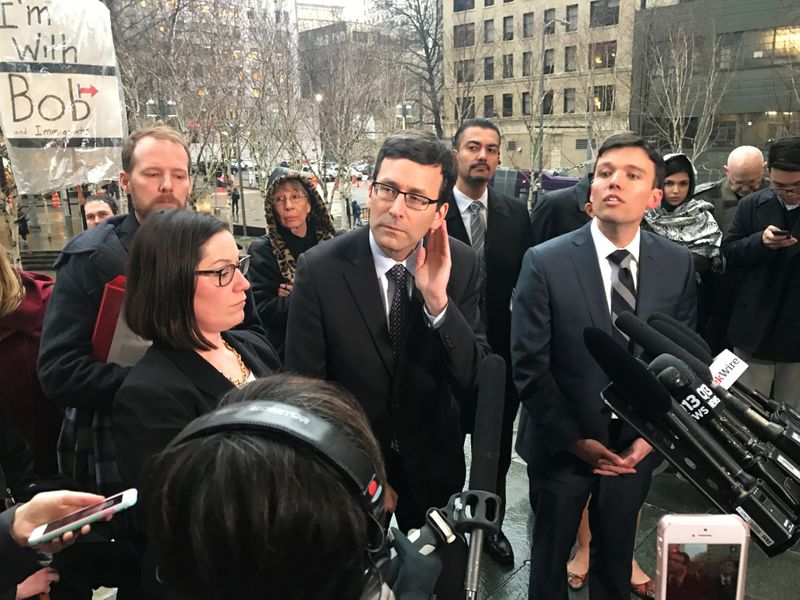By Nate Raymond
(Reuters) - Washington state's attorney general on Monday argued in court that three large drug distributors' excessive shipments of pain pills helped fuel the U.S. opioid epidemic, calling it the "worst man-made public health crisis in history," as the state sought to recoup an estimated $95 billion.
The argument came at the start of a trial in the state's bid to recover more money from distributors McKesson Corp (NYSE:MCK), Cardinal Health Inc (NYSE:CAH) and AmerisourceBergen (NYSE:ABC) Corp than it would have received in a $26 billion nationwide settlement.
Lawyers for the state, led by Attorney General Bob Ferguson, said the companies fell short of their legal obligations to operate systems to prevent the diversion of pain pills from legitimate uses and to stop suspicious orders of opioids from going to pharmacies.
They did so while shipping 3.8 billion opioid doses into Washington from 2006 to 2018, the state's attorneys told King County Superior Court Judge Michael Scott in Seattle, who is hearing the case without a jury.
The state's lawyers argued the companies' failures contributed to a crisis that led to 10,800 opioid overdose deaths in Washington since 2006.
"Indeed, we know they were aware of the harms flowing from their conduct because in private correspondence company executives mocked individuals suffering the painful affects of opioid dependence," Ferguson said in his opening statement.
As one example, the state's lawyers displayed a 2011 email in which an AmerisourceBergen employee shared a parody theme song to that of "The Beverly Hillbillies" TV show that described how people drove to obtain drugs at Florida pill mills.
"A Bevy of Pillbillies!" the email said.
Defense lawyers acknowledged the epidemic was serious but said the companies bore no responsibility for it, saying opioid misuse was instead usually due to drug traffickers and unused opioids sitting in medicine cabinets.
Enu Mainigi, Cardinal Health's lawyer, said shipments grew not because of any corporate misconduct but instead due to a rising number of opioid prescriptions as the medical community and regulators, starting in the 1990s, embraced opioids to treat pain.
"The consensus was that pain needed to be treated more aggressively and opioids were the right way to do it," she said.
'NO CONNECTION'
AmerisourceBergen lawyer Robert Nicholas, citing a government watchdog report, said the company reported all suspicious orders to the U.S. Drug Enforcement Administration but that agency failed to act on them.
"They're acting as if our reporting suspicious orders would have stopped the crisis in its tracks," he said. "That's simply not the case. There's no connection."
Washington is seeking $38.2 billion to fund treatment and other programs and billions more in penalties and forfeited profits. The distributors, who deny wrongdoing, say the state wants a "wildly inflated recovery" of more than $95 billion.
More than 3,300 lawsuits by largely state and local governments have been filed seeking to hold those and other companies responsible for a drug abuse crisis the U.S. government says led to nearly 500,000 opioid overdose deaths over two decades.
Washington state would have been eligible for $527.5 million if it had joined a proposed $26 billion global deal, under which the distributors would pay up to $21 billion and drugmaker Johnson & Johnson (NYSE:JNJ) would pay $5 billion.
Ferguson, a Democrat, has criticized the settlement as "not nearly good enough," saying the nearly $30 million on average the state and its communities would receive annually was insufficient to address the devastation caused by the epidemic.
The state became one of eight not to participate in the distributors' nationwide accord and opted to proceed to trial.
Plaintiffs in some of the other opioid cases have recently faced setbacks pursuing nuisance claims.

Oklahoma's top court on Tuesday overturned a $465 million judgment against J&J, and a California judge this month ruled in favor of four drugmakers in a case brought by several large counties.
Closing arguments were delivered Monday in an opioid trial in Ohio involving three pharmacy chains.